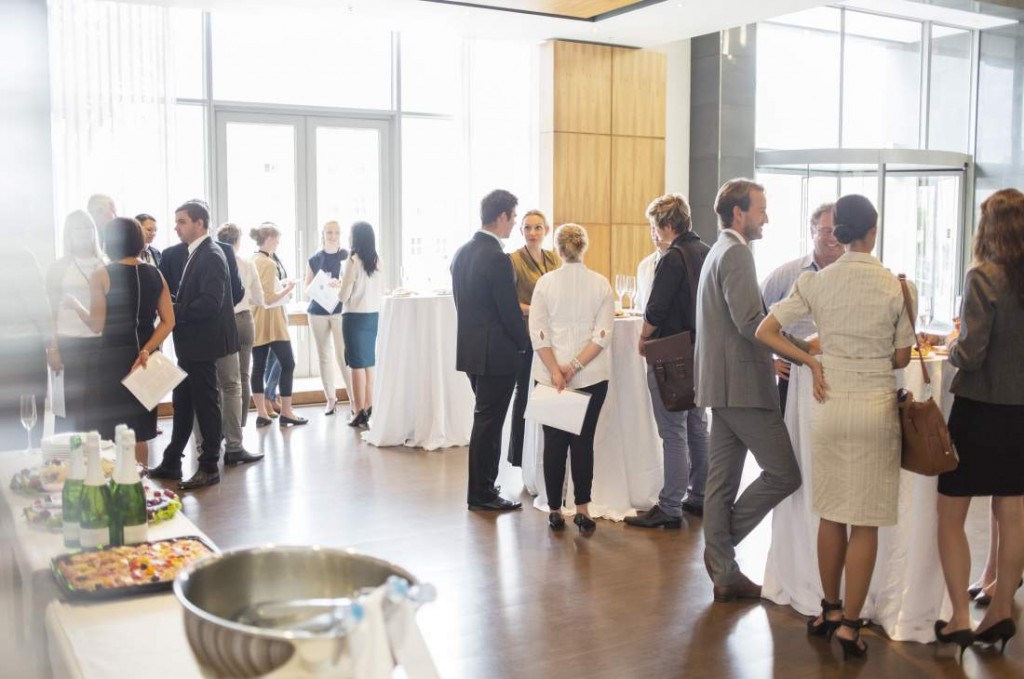Forget the sweaty palms and anxiety over meeting people you don’t know. If you’re going to attend a conference, consider all the benefits! Networking at a conference is, believe it or not, easier than you think – even if you are a shy person or you think that networking is only for those who like ‘schmoozing.’ Follow the tips below and you may find that you actually have a good time!
The benefits from networking at a conference include meeting new people who can give you new information or leads that could generate new ideas or open up new possibilities for you. Think about staying focused on the positive outcomes and enjoying yourself rather than worrying about putting your foot in your mouth. At conferences you will be in close proximity to some big names, leaders in your field, and what a great opportunity to learn from them and give them the opportunity to get to know you too.
Now, you can disregard these suggestions and simply do what makes you feel most comfortable, or you can take a deep breath, challenge yourself and give these suggestions a go. Remember that networking is simply about creating an opportunity to develop positive working relationships. It’s not about trying to sell something to someone.
1. Start networking before you even arrive at the conference. Find out who will be presenting and when, who will be attending, who would be in your area of interest and who might be interested in what you have to offer. Have a look at presenters’ websites, find out items of interest and check out their background on LinkedIn.
2. Find out key presenters emails and drop them a short note to introduce yourself and let them know you look forward to listening to their talk. This may provide a surprisingly easy opening for you at the conference to make contact.
3. Most likely you will be provided with a name tag at the conference. Wear it as it makes it easier for all those you meet to remember your name.
4. Arrive early, sit up front, and be attentive so you can raise relevant points after the presentation. Make sure you have your business cards with you and perhaps even a personalised note on the back. (Make sure your business card clearly states what you do and represent – the presenter will receive many cards during the conference so you need to stand out.) After the presentation, if there is the opportunity to speak with the presenter, tell the presenter how much you enjoyed the talk and why. Ask relevant open-ended questions. Ask if you can follow up with an email to them or even a phone call. If you don’t ask, you’ll never know how accommodating the presenter might be.
5. When talking, get to the point quickly. Have questions prepared so you won’t be tongue tied if feeling a little nervous. You may wish to preface your conversation with something like, “I have two quick questions if there’s time …” It might be possible to arrange to see the presenter again at another similar event during the conference if they are not free to talk right away. If appropriate have your promotional material (preferably brief and compelling reading) on hand to pass on IF appropriate.
6. A good networker is a good listener, so while you are talking to the presenter focus 100% on them and not anyone else. Encourage the presenter to talk. Maintain eye contact and open body language. If you promise to follow up on something you’ve discussed, take a quick note and ensure that you do follow up as soon as you can.
7. Enjoy your time, however brief, with your target audience. This can be fun as well as a good opportunity to connect with an industry leader.
8. Make sure you know when time is up and excuse yourself so that you don’t dominate anyone for too long a period of time. If the presenter is not able to speak with you, be gracious and move on, there will plenty of others to network with. If the presenter came with a team, this is a good opportunity to reach out to them as well. They are within the Sphere of Influence of the presenter and while not at the top of the chain, they are valuable employees or assistants who may have more time to find out about you. This may lead eventually to additional mutually beneficial connections.
9. Makes notes on the back of business cards you receive during the conference and events. If you make contact with a lot of people it will be difficult to remember everything after a day or so.
10. Follow up. Send an email to each person with whom you connected with a compliment and any information you may have promised. Connect with them on LinkedIn. Share information generously – that’s what networking is all about, developing relationships. Continue to maintain contact every once in a while with all those with whom you made a good connection. Networking is not just about developing new relationships it’s about maintaining those relationships over time.
Attend as many of the social functions connected to the conference as possible as it opens up more networking opportunities – and you could make some new friends while having an amazing time too! Good luck!












